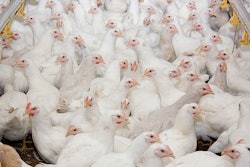Tyson Foods, Inc. provided tours of two production plants in Northwest Arkansas on Friday, April 24 to state and federal health officials to outline the safety measures and social distancing efforts in place at Tyson facilities.
Plant managers led extensive tours of the company’s Berry Street plant in Springdale, Ark., and Chick-N-Quick plant in Rogers, Ark.
Attending the tours were:
- Dr. Richard McMullen, state environmental health director and associate director for science, Center for Local Public Health, Arkansas Department of Health
- Dr. Allison James, epidemic intelligence service officer with the CDC
- Pansy James, RN and administrator, Dr. Bates Outreach Clinic, Arkansas Department of Health
- Eldon J. Alik, consul general for the Marshall Islands Consulate General Office of Arkansas
- A private primary care physician from Northwest Arkansas
Officials on the tour observed numerous health and safety measures the company implemented to combat the spread of COVID-19, including widespread use of hand sanitizer stations and employees’ temperatures being taken prior to entering the facility via thermal scanners.
Also highlighted were social distancing measures that Tyson has put in place, including the designation of social distancing monitors (individual employees whose responsibility is to prompt compliance with recommended distancing), dividers between workstations on the plant floor and at breakroom tables, and tents for additional breakroom space outside.
All Tyson employees are required to wear surgical masks. The company provides each employee with a new mask at the start of his or her shift. The company started an intense effort to secure an ample supply of face coverings even before the CDC recommended their use, even chartering a cargo plane from China to obtain the masks.
“Tyson is taking measures to protect its team members, and anywhere people were in close proximity they have barriers between workers, and they were well spaced,” said Dr. Richard McMullen, state environmental health director, Arkansas Department of Health. “Everyone was wearing masks and it was very well done. Tyson is an industry leader and these measures are an opportunity for others to learn best practices to keep employees safe.”
“I want to thank Tyson for the opportunity to visit their plant and am glad to see Tyson Foods taking a leading role to keep employees safe. I was impressed with all the measures they’re taking to make sure COVID-19 isn’t spread in their plant and the ways they’re taking care of their employees,” said Eldon J. Alik, consul general for the Marshall Islands Consulate General Office of Arkansas. “More measures were being taken than I expected.”
“We are a culture where people want to get together and visit each other, so it’s a matter of educating our community on the importance of social distancing and how to be safe at home to prevent community spread,” Alik said.
“The intent of this tour was to showcase safety measures Tyson Foods has in place to protect our team members and offer best practices to other industry leaders,” said Tom Brower, senior vice-president, Health and Safety, Tyson Foods. “While we take our responsibility to feed the nation seriously, we’re focused on keeping our team members safe because their health is our top priority.”
Tyson Foods formed a coronavirus task force in January and has implemented numerous measures to protect workers. The company’s efforts have included:
- Taking worker temperatures and installing more than 150 infrared walkthrough temperature scanners in its facilities.
- Securing a supply of face coverings before the CDC recommended their use and now requiring use in company facilities.
- Conducting additional deep cleaning and sanitizing in all company facilities, including break areas, cafeterias and restrooms.
- Implementing social distancing measures, such as installing workstation dividers, providing more breakroom space, erecting outdoor tents for additional space for breaks, and staggering start times to avoid large gathers as team members enter the facility.
- Relaxing its attendance policy to encourage workers to stay at home when they’re sick and eliminating the waiting period for eligibility on short-term disability benefits, so workers can receive pay while they’re sick with the flu or COVID-19.

















